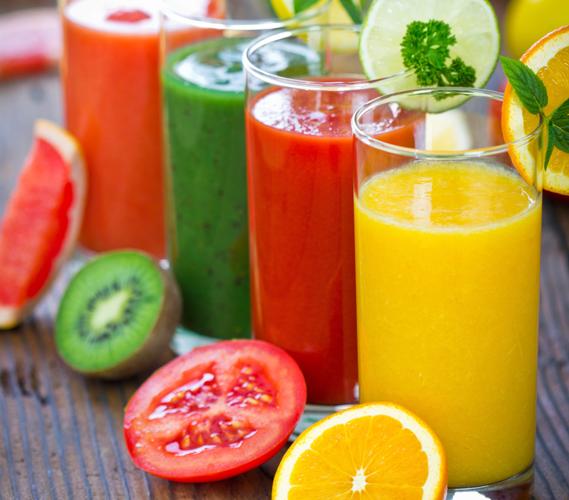In a world where health trends come and go like passing seasons, few have sparked as much debate as the juice cleanse. Lauded by some as a path to rejuvenation and detoxification, yet critiqued by others as a fleeting fad with potential pitfalls, juice cleanses have carved a niche in the wellness landscape. But what lies beneath the surface of this liquid diet? Are these vibrant concoctions a gateway to health or a slippery slope to nutritional imbalance? As we peel back the layers of this juicy phenomenon, we delve into the science, the stories, and the skepticism that surround the colorful bottles lining store shelves. Join us as we explore whether juice cleanses are a refreshing reset or a recipe for harm.
Understanding the Science Behind Juice Cleanses
At the core of juice cleanses lies the belief in detoxifying the body by consuming only fruit and vegetable juices for a set period. Proponents argue that this practice offers a plethora of benefits, from improved digestion to enhanced energy levels. They claim that the natural sugars, vitamins, and antioxidants in fresh juices help flush out toxins, boost the immune system, and even promote weight loss. Advocates often highlight the following potential benefits:
- Increased Nutrient Intake: Juices provide a concentrated source of vitamins and minerals, which might be challenging to consume in large quantities through whole foods alone.
- Improved Digestion: By giving the digestive system a break from solid foods, some believe that the body can focus on repairing and healing itself.
- Enhanced Hydration: Consuming high-water content juices can help maintain hydration levels.
However, skeptics question the scientific backing of these claims. Critics argue that the body already has efficient systems, like the liver and kidneys, to detoxify itself without needing a juice cleanse. Moreover, they warn of potential drawbacks, such as nutrient deficiencies due to the lack of protein and fiber in juice-only diets. Concerns include:
- Blood Sugar Spikes: The high sugar content in some fruit juices can lead to increased blood sugar levels, which might be risky for individuals with certain health conditions.
- Muscle Loss: A lack of protein intake can result in muscle degradation over time.
- Short-term Weight Loss: Any weight loss experienced is often temporary, primarily due to water loss rather than fat reduction.

Exploring Potential Health Benefits and Risks
Delving into the realm of juice cleanses unveils a tapestry of potential health benefits that some advocates swear by. Proponents often highlight the detoxifying properties of these liquid regimens, suggesting that they can help flush out toxins and rejuvenate the body’s systems. Enthusiasts also point to potential benefits such as:
- Enhanced nutrient absorption due to the concentrated intake of vitamins and minerals.
- Improved digestion as a result of giving the digestive tract a temporary break from processing solid foods.
- Increased energy levels stemming from a cleaner, more efficient body system.
However, it’s essential to tread carefully, as the allure of these cleanses often masks the possible downsides. Critics argue that juice cleanses may lead to nutritional deficiencies, as they can lack essential macronutrients like protein and healthy fats. There’s also the risk of blood sugar spikes, especially with juices high in natural sugars, which could be a concern for individuals with insulin sensitivity. Additionally, some report feelings of fatigue and irritability due to the sudden drop in caloric intake. It’s crucial to weigh these factors and consult with healthcare professionals when considering such a regimen.

Nutritional Insights: What You Might Be Missing
Juice cleanses often promise detoxification and weight loss, yet they may not be the nutritional elixirs they claim to be. While fresh juices can be rich in vitamins and antioxidants, they often lack essential nutrients such as protein and healthy fats, which are crucial for maintaining energy levels and supporting bodily functions. Fiber, another critical component for digestion and satiety, is typically removed during the juicing process, potentially leading to blood sugar spikes and cravings. It’s important to consider the following potential downsides:
- Nutrient Deficiency: Extended juice cleanses can result in a lack of protein, fiber, and healthy fats.
- Metabolism Impact: Consuming only juices may slow down metabolism due to reduced calorie intake.
- Short-term Effects: Weight loss from juice cleanses is often temporary and mainly due to water loss.
On the flip side, incorporating juices as part of a balanced diet can offer benefits, such as increased vitamin intake and hydration. However, the key lies in moderation and ensuring that juices complement rather than replace whole foods. When considering a juice cleanse, it’s essential to weigh both the potential benefits and drawbacks, and possibly consult with a healthcare professional.

Expert Recommendations for a Balanced Approach
To navigate the potential benefits and pitfalls of juice cleanses, experts suggest a balanced approach that incorporates the following guidelines:
- Moderation is Key: Instead of long-term juice cleanses, consider incorporating juices as a supplement to a balanced diet. This ensures that you’re not missing out on essential nutrients found in whole foods.
- Consult a Nutritionist: Before starting any cleanse, it is advisable to consult with a healthcare professional or a nutritionist. They can help tailor a plan that suits your individual health needs and goals.
- Focus on Quality: Choose juices made from fresh, organic produce to minimize exposure to pesticides and maximize nutrient intake. Avoid juices with added sugars and preservatives.
- Listen to Your Body: Pay attention to how your body responds. If you experience fatigue, dizziness, or other adverse effects, it may be time to adjust your approach.
By integrating these expert-backed strategies, individuals can enjoy the potential benefits of juicing without compromising their overall health.
To Conclude
As we close the chapter on the swirling debate over juice cleanses, it becomes clear that the answer may not be as simple as black or white. For some, these vibrant elixirs offer a refreshing reboot, a chance to reconnect with mindful consumption. For others, they may pose risks that outweigh the perceived benefits. Ultimately, the truth may lie in balance and moderation, as it often does. Whether you choose to embrace the cleanse or savor your fruits and veggies in their whole form, the key is listening to your body and its unique needs. So, as you sip on your next glass, may it be filled with knowledge, curiosity, and a zest for well-being. Here’s to finding your own path to health, one sip at a time.




